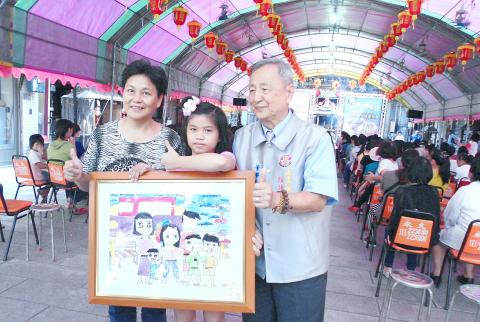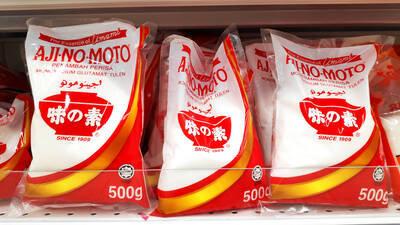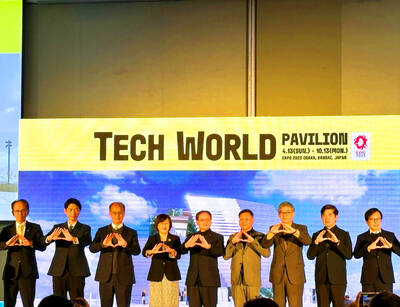Due to family circumstances, Hsu Fang-yu, a fourth-grade student at Chiayi Municipal Ta-tung Elementary School, lives with her grandmother, who makes a living from collecting items for recycling, and her great-grandmother. Hsu likes drawing. By chance, she found some wax crayons among the things her grandmother had collected for recycling, learning by herself, she found something she was very good at. In the third grade at elementary school, she was admitted to a class for artistically gifted children. On Sept. 19 she received a commendation as an “angel in adversity” from the Chiayi Cheng-huang Temple’s charity foundation. Hsu attended the prize-giving activity along with her grandmother and took along a drawing she had done of her whole family. The story of how she has made advances in spite of adversity is quite moving.
Hsu says that her mother looks after her two younger brothers, who are late developers, on her own in Taichung, so she, her 56-year-old grandmother and 93-year-old great-grandmother have to depend on one another. Apart from a military pension, their household income is supplemented by her grandmother’s earnings from recycling. Hsu helps with collecting and sorting things for recycling, and the stationery and drawing materials she uses are picked out from among the recyclables.
The girl’s grandmother, Wang Ching-chung, says that when Hsu gets home she helps by hanging clothes out to dry, bringing them in again and sweeping and mopping the floor. When her great-grandmother goes out, she always walks along with her and gives her a helping hand. Although she lives in a poor household, Hsu is resilient and hardworking, and she is very respectful and obedient. They are lucky to have such a well-behaved little girl, says Wang.
(Liberty Times, translated by Julian Clegg)

Photo: Ting Wei-chieh, Liberty Times
照片:自由時報記者丁偉杰
嘉義市大同國小四年級學生許芳瑜,因家庭因素,跟著從事資源回收的祖母以及曾祖母同住。她喜歡畫畫,無意間從祖母撿回的資源回收物找到蠟筆,靠著自學,畫出一片天,小三考進美術資優班,九月十九日接受嘉義城隍廟慈善會「逆境天使」表揚,許芳瑜與祖母一起出席授獎活動,還帶來一幅「全家福」畫作。逆境向上的故事,讓人感動。
許芳瑜說,因媽媽在台中獨力照顧兩個發展遲緩的弟弟,她必須跟五十六歲祖母,及高齡九十三歲曾祖母相依為命;家裡生活開銷除領榮民撫恤金,另由祖母從事資源回收補貼家用。她會幫忙回收、分類,所用的文具及畫具都是從回收物挑選而來。
祖母王敬忠說,芳瑜放學回家會幫忙曬衣服、收衣服、掃地、擦地;阿祖外出,一定跟前跟後,攙扶阿祖。雖然家境清寒,芳瑜刻苦努力,十分孝順,非常難得。
(自由時報記者丁偉杰)

Monosodium glutamate (MSG) has been used in cooking for over a century to enhance flavor. It is often found in Chinese dishes and many other cuisines. Despite its common use, many people misunderstand the safety of MSG. The bad __1__ of MSG started in the late 1960s, when a letter to the New England Journal of Medicine described symptoms like a racing heart, weakness, and numbness after the writer ate Northern Chinese food. While no specific cause was __2__, a series of questionable studies in 1968 began to point the finger at MSG. In one such study, neurologist Herbert Schaumburg and

A: The World Expo 2025 is about to open in Osaka. Is Taiwan going to participate in the event too? B: Sure, the Taiwan External Trade Development Council (TAITRA) will launch a Taiwan pavilion named “Tech World.” A: That sounds cool, and it can showcase our national strength in technology. B: The theme is “Connecting the world to create better future lives together.” The pavilion aims to attract over one million visitors. A: I hope humans can really create better future lives through this year’s fair. A: 2025年世博會即將開幕,這次台灣也會參加嗎? B: 當然啦,外貿協會的台灣館將以「Tech World」名義參展! A: 聽起來蠻酷的,應該是想強調台灣的科技實力。 B: 策展主題則是:「連結世界,共創未來美好生活」,希望能吸引到100萬人次參訪。 A: 希望藉由這次世博會,人類真的能共創美好生活。 (By Eddy Chang, Taipei Times/台北時報張迪)

Even as he grows older, Microsoft founder Bill Gates still fondly remembers the catalytic computer code he wrote 50 years ago that opened up a new frontier in technology. Although the code that Gates printed out on a teletype machine may look crude compared to what’s powering today’s artificial intelligence platforms, it played a critical role in creating Microsoft in April 1975 — a golden anniversary that the Redmond, Washington, company celebrated on April 4. Gates, 69, set the stage for that jubilee with a blog post reminiscing on how he and his old high school friend — the late Paul Allen

The study had several issues. Small sample sizes made it hard to draw __7__ conclusions. Additionally, taking a __8__ like pure MSG on an empty stomach is likely to make a person ill in any case. Choosing individuals who already had a history of the symptoms could have created a bias because they were likely to __9__ the reactions again. When real scientific research on the effects of MSG was eventually done, many of the myths surrounding it were proven __10__. The U.S. Food and Drug Administration and other global organizations have found MSG safe to eat. Today, MSG